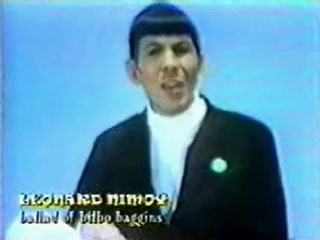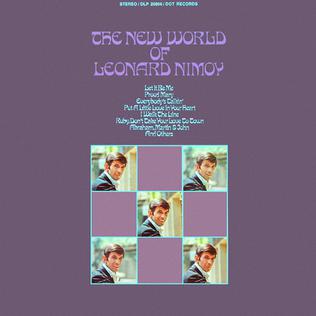Star Trek is an American science fiction television series created by Gene Roddenberry that follows the adventures of the starship USS Enterprise (NCC-1701) and its crew. It acquired the retronym of Star Trek: The Original Series (TOS) to distinguish the show within the media franchise that it began.

Leonard Simon Nimoy was an American actor and director, famed for playing Spock in the Star Trek franchise for almost 50 years. This includes originating Spock in the original Star Trek series in 1966, then Star Trek: The Animated Series, the first six Star Trek films, Star Trek: The Next Generation, Star Trek, and Star Trek Into Darkness. Nimoy also directed films, including Star Trek III: The Search for Spock (1984), Star Trek IV: The Voyage Home (1986), and Three Men and a Baby (1987), and appeared in several films, television shows, and voice acted in several video games. Outside of acting, Nimoy was a film director, photographer, author, singer, and songwriter.

Spock is a fictional character in the Star Trek media franchise. He first appeared in the original Star Trek series serving aboard the starship USS Enterprise as science officer and first officer and later as commanding officer of the vessel. Spock's mixed human–Vulcan heritage serves as an important plot element in many of the character's appearances. Along with Captain James T. Kirk and Dr. Leonard "Bones" McCoy, he is one of the three central characters in the original Star Trek series and its films. After retiring from active duty in Starfleet, Spock served as a Federation ambassador, and later became involved in the ill-fated attempt to save Romulus from a supernova, leading him to live out the rest of his life in a parallel universe.

The Vulcan salute is a hand gesture popularized by the 1960s television series Star Trek. It consists of a raised hand with the palm forward and the thumb extended, while the fingers are parted between the middle and ring finger. The gesture was devised by Star Trek actor Leonard Nimoy as a salute for the alien Vulcan species, and is popular within the Science fiction fandom and nerd culture. The blessing phrase "live long and prosper" is frequently spoken alongside it.

In the fictional Star Trek universe, the Vulcan nerve pinch is a fictional technique used mainly by Vulcans to render unconsciousness by pinching a pressure point at the base of the victim's neck.
"Plato's Stepchildren" is the tenth episode of the third season of the American science fiction television series Star Trek. Written by Meyer Dolinsky and directed by David Alexander, it was first broadcast on November 22, 1968.
"The Empath" is the twelfth episode of the third season of the American science fiction television series Star Trek. Written by Joyce Muskat and directed by John Erman, it was first broadcast on December 6, 1968.

"Marge vs. the Monorail" is the twelfth episode of the fourth season of the American animated television series The Simpsons. It originally aired on the Fox network in the United States on January 14, 1993. The plot revolves around Springfield's impulse purchase of a faulty monorail from a conman, and how it subsequently falls to Marge to stop the train from destroying the town.

"The Ballad of Bilbo Baggins" is a song composed by Charles Randolph Grean and performed by Leonard Nimoy, telling the story of Bilbo Baggins and his adventures in J. R. R. Tolkien's 1937 novel The Hobbit. The recording was featured on the 1968 album Two Sides of Leonard Nimoy, the second of Nimoy's albums on Dot Records. It was also released as a single in July 1967, backed with a "modern thought-image" folk song called "Cotton Candy".

The discography of American actor Leonard Nimoy consists of SEE BELOW.

Adam B. Nimoy is an American television director. He is the son of actors Leonard Nimoy and Sandra Zober.

William Shatner is a Canadian actor. In a career spanning seven decades, he is best known for his portrayal of James T. Kirk in the Star Trek franchise, from his 1966 debut as the captain of the starship Enterprise in the second pilot of the first Star Trek television series to his final appearance as Captain Kirk in the seventh Star Trek feature film, Star Trek Generations (1994).

Leonard Nimoy Presents Mr. Spock's Music from Outer Space is the debut album of Leonard Nimoy, recorded in character as Mr. Spock from the NBC TV series Star Trek. It was released in April 1967 by Dot Records and reached number 83 on the Billboard 200.

The Way I Feel is the third studio album by Leonard Nimoy. It was released in August 1968 by Dot Records, less than a year after Two Sides of Leonard Nimoy was released.

The New World of Leonard Nimoy is the fifth and final album of Leonard Nimoy. Dot Records released the album in June 1970.

"I Just Can't Help Believing" is a song written by Barry Mann and Cynthia Weil.

The development of Spock, a fictional character first introduced in the American science fiction television series Star Trek, began prior to the start of the series. The first known mention of Spock was in a discussion between Gene Roddenberry and Gary Lockwood, where the latter suggested Leonard Nimoy for the role. Roddenberry agreed with the suggestion, and Nimoy became the first choice actor for the part. However, Roddenberry was required to audition other actors for the role. It was offered to both DeForest Kelley and Martin Landau before Nimoy. Nimoy disliked the prosthetic ears he was required to wear, and there were concerns from the studio that they made him appear satanic. Roddenberry fought to keep the character in the second pilot, "Where No Man Has Gone Before" after the rest of the main cast was dropped from the initial pilot, "The Cage".

In the episode of Star Trek: The Original Series titled "Plato's Stepchildren", season 3 episode 10, first broadcast November 22, 1968, Uhura and Captain Kirk kiss. The episode is often cited as the first example of an interracial kiss on television.














